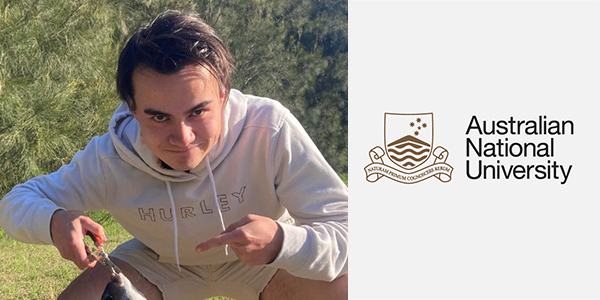Adam Glanville was a participant in the 2022 Virtual Agriculture Professional Practicum. Adam is a Bachelor of Environment and Sustainability/Bachelor
of Politics, Philosophy and Economics student from The Australian National University. Adam received a $3,000 New Colombo Plan Mobility Grant to support his participation in this program.
Q: Why did you decide to undertake the ACICIS virtual internship program?
Learning languages, studying environmental science and gardening are all things which are worthwhile and enjoyable. The ACICIS virtual professional agriculture practicum seemed to reside at the intersect of these three fields. Therefore, it seemed like a worthwhile and enjoyable way for me to spend some quality time and brainpower. In retrospect, it was just that.
Q: Did you receive a New Colombo Plan Mobility Grant? Do you think the NCP is an important initiative?
Yes, I did. I think that it’s a great initiative for fostering robust international relationships between Australia and its Asian neighbours. Indonesia is already a close economic ally of Australia, and this relationship will need people with the skills and connections developed by the New Colombo Plan to continue to flourish in the future.
Q: How have you found the academic components of this virtual program – i.e. the language classes/seminars?
I’ve learnt many languages before with many teachers, and I thought the language classes in this program were exceptional. I learnt a lot in a short time, and rarely felt like I was out of my depth. Shoutout to Ibu Dette.
Seminars were good. I certainly have a broad and fairly deep knowledge of Indonesian agriculture and Indonesian society, economics and culture more broadly as a result. Speakers were usually very high-class Indonesian academics, and their names frequently appeared in journal articles, reports and books.
Q: What organisation are you interning with? (Explain your role and responsibilities)
I interned at Kemitraan (Kem-ee-tra’an)– the Partnership for Governance Reform in Indonesia. Kemitraan is a globally-recognised think tank which provides policy assessment, analysis and advice to Indonesia’s government. Their recent projects have ranged from police reform to climate budget assessment.
My particular role at Kemitraan was to research and advise the Kemitraan Knowledge and Resource Centre team on the impacts of climate change on food security. The research I provided can now be used to inform meaningful programs to increase the resilience of Indonesia’s food supply in future.
Q: How have you found the work culture (albeit online) of your host organisation? How is it different to work experience in Australia?
The work culture at Kemitraan was great; the team were super friendly, non-judgemental and knowledgeable. They seemed genuinely interested in Australian agricultural practices, governance and culture – which made my experiences feel valued.
Language barriers, time differences and the wonders of Zoom presented some challenges, but nothing close to insurmountable.
Q: What are the main skills you have learnt during your virtual internship?
How to best use my energy, e.g. making the most of the times when I know I’m the most productive, minimising distractions.
The importance of the little things for working many hours, e.g. eating healthy, sleeping long, exercising regularly.
How to engage in foreign work environments, e.g. acknowledging and adapting to cultural differences and time differences.
Q: What did you find to be the most rewarding part of this virtual experience?
Developing my Bahasa Indonesia to the level where I could, maybe, order KFC in Indonesia. Enak sekali.
Q: Were you able to learn about the Indonesian culture from this virtual program? If yes, how was this achieved?
Absolutely. I have never been to Indonesia before, and have not studied Indonesian language or culture since primary school, which was a common story among the students who went through Australia’s public school system. Specific seminars taught me specific things about Indonesia, but most of my Indonesian general knowledge came through the people.
Q: How will the virtual internship benefit or influence your future career?
I’ve learned heaps about agriculture, climate change, Indonesia’s social/economic/cultural/diplomatic/political situation, Indonesia’s language and Indonesia’s relationship with Australia. I could imagine how this knowledge could be useful in consultancy roles, international relations, and so on.
Q. Would you recommend this virtual program to your friends?
Yeah.
Q. Favourite Indonesian word/phrase:
Saya sudah makan pagi.
Q. Describe your experience of the virtual internship program in three words:
Worth my time.


